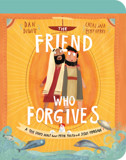
Good stories may age, but they never die. They grow old with us. And the best ones outlive us.
Powerful stories speak to a universal need and point to eternal truths. That’s why the stories in the Bible, above all stories, have perennial appeal. Even epic stories outside the Bible that garner massive attention often do so through redemptive themes that only make sense from a Christian perspective.
The Bible is more than a mere story, but it isn’t less. Other stories might inspire us, but the Bible is inspired in a way that is categorically different from any other literature. While our first goal as Bible readers is to understand the meaning of the text, I think sometimes it is helpful to step back and consider different angles to a biblical account.
One of my favorite true tales from the Gospels is found in the last chapter of John’s Gospel. This passage follows the lowest moment in the disciple Peter’s life. It ends with the highest example of hope for broken disciples like him, you, and me. Consider some of the elements of the story that make it so appealing…

Beautiful board book pointing toddlers to Jesus, the friend who forgives. Ideal for Lent and Easter.
The majority of humans learn through repetition. Precious few of us have photographic memory. We need truths to be repeated again, and again, and again.
Look at the story of Peter’s denial. Jesus predicted it. Peter did it. Then Jesus used Peter’s predicted failure to drive home a point. Peter denied Jesus three times, and what do you know, Jesus gave Peter three chances to say “I love you".
Jesus uses this link between Peter’s three-fold failure and his three-fold restoration to drive home a powerful point. “Do you love me?” Jesus asked. “Yes!” Peter proclaims. And each time Jesus uses this reference point to bring in a new element.
“Feed my sheep,” Jesus repeats again and again and again. Jesus starts with the familiar and moves to the new. The perfect parallel of Peter’s failure and restoration points to a new reality. Interestingly, this is a pattern for all of us. We not only learn from repetition but we grow outward, beginning with and then moving away from the familiar.
"While the Bible isn’t a manual on how to teach or write, it has a lot of lessons like these along the way for those with eyes to see."
Every good story packs in details that add colour and context. For example, Disney movies often hide “Easter eggs,” little clues of past movies, in newer films. In the Bible, these are elements that might be lost on us in the first reading, or even the first several readings. In fact, since the New Testament was originally written in Greek, we might miss them altogether.
In the story of Peter there is a neat detail that adds colour and context to Peter’s encounter with Jesus. The author, John, uses a specific Greek word to describe the fire over which Peter warmed himself during the cold night when he denied Jesus. The original Greek word for fire lets us know it was a fire made from coal. Why is that important or interesting?
John uses that same word to describe the fire over which Jesus cooked fish on that warm morning when he gave Peter the present of forgiveness. That was a coal fire too. Peter denied Jesus over a coal fire and Jesus gave him a chance to start again. It was over the same kind of fire that Peter was able to now say he not only knew Jesus, but that he loved him.
One last element in this story is worth noting. Jesus taught a lesson with food. He did that a lot. Maybe there’s something to Bible-study teachers giving out snacks to children when they teach their Sunday morning lessons. It seems deeply biblical. The Bible even uses food to describe itself – that we can enjoy milk but God wants to in time teach us to eat meat.
We understand food. We need it. We like it. Jesus taught us to think this way about God – that he gives us a cup to drink and bread to eat. The Bible begins with food in the Garden and ends with a feast in the New Creation where humanity once again dwells in God’s presence.
While the Bible isn’t a manual on how to teach or write, it has a lot of lessons like these along the way for those with eyes to see. I wanted to tell this story for children. When I wrote about it in the book The Friend Who Forgives, illustrated by Catalina Echeverri, I was reminded of a quote from C.S. Lewis.
“A children’s story which is enjoyed only by children,” Lewis said, “is a bad children’s story.” Of course this story about Peter is inspired by God and meant for us all, but it is a story that truly appeals to every generation. We all need hope for our hard times and dark moments. And this story has it all. Best of all, it’s true. That’s good news for you and me!